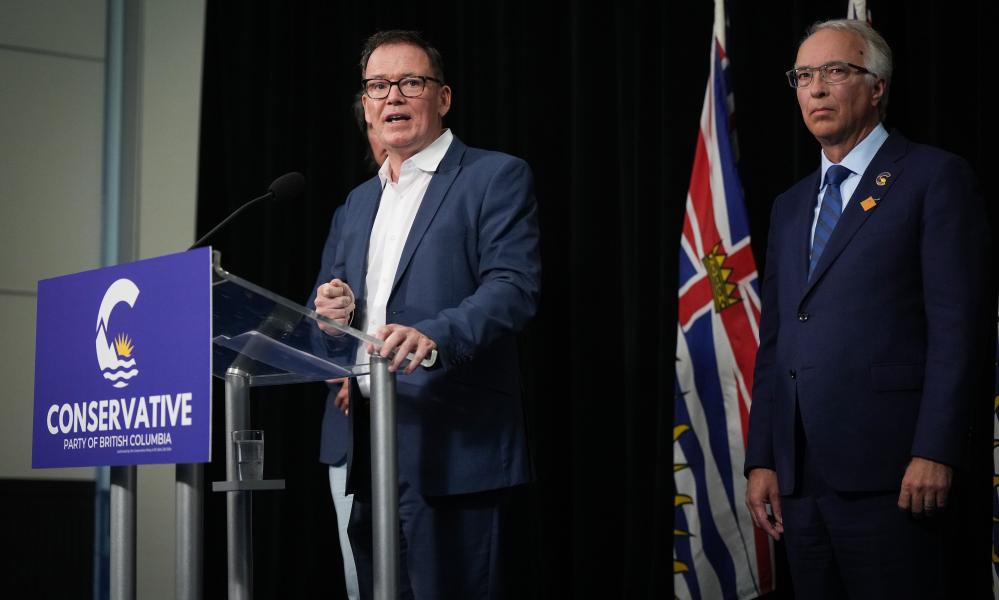CanadaThe westernmost province of is in the grip of a chaotic provincial election campaign, full of political betrayals, sudden resignations and unexpected loyalties.
And as an unpopular premier takes on a climate crisis skeptic, the October election could have major implications for British Columbia, a province seen as the vanguard of progressive climate policy.
Until recently, voters were divided between the governing New Democratic Party (NDP, a left-leaning party in power since 2017) and the rebellious British Columbia Conservative, or BC United, a new version of a party that has long dominated politics in the province.
Related: Portrait of Winston Churchill stolen from Canadian hotel discovered in Italy
However, the campaign has descended into chaos after BC United leader Kevin Falcon announced he would withdraw his party from the election, citing fears that right-wing voters would be split in favor of the British Columbia Conservative Party.
The move, which shocked candidates and party insiders alike, was a stark admission that efforts to revive the party had failed – and heralded a dramatic change in the province’s political landscape.
For decades, BC United was known as the BC Liberal Party, a center-right faction that governed from 2001 to 2017 and crushed the opposition in a single election by winning 76 of the 79 seats in the legislature. But in 2023, the Liberals voted to rename the party, a goal Falcon championed in his leadership campaign.
The party spent C$1 million on a rebranding campaign, but according to the CBC, a recent internal poll found that about 30% of party members were unfamiliar with the new name. In late July, the party even said has requested the electoral authorities to place the old name in brackets on the ballot paper for the provincial elections in October.
“By dismantling the BC Liberal brand, (Falcon) has effectively killed the party that was once the natural governing party of British Columbia politics,” said Shachi Kurl, executive director of the Angus Reid Institute, a nonprofit that conducts public opinion research.
And so, on August 28, a solemn Falcon announced that he would suspend his party’s campaign and endorsed British Columbia Conservative Party leader John Rustad for prime minister—a man he had accused days earlier of leading a party that was “at risk of becoming a conspiracy party, not a Conservative party.”
Rustad, a former BC Liberal, was expelled from the party by Falcon over controversial social media posts about the climate crisis
Rustad then took over the helm of the ailing Conservatives, a party rivals have criticized as “downright strange” because of conspiracy theories spread by members, including that 5G wireless technology was a cause of the coronavirus pandemic.
Although they have no ties to the federal Conservative Party, Rustad’s BC Conservatives have nevertheless stoked anti-incumbent sentiment, fueled by broader support for the so-called “common sense” policies of federal Conservative leader Pierre Poilievre.
Rustad has also forged unlikely alliances in his hopeless bid for the province’s top job. In early July, former Green Party leader Andrew Weaver, a climate scientist, praised Rustad as a “listener” and argued that current Premier David Eby “surrounds himself with people who will help him control the government through his office … and that’s not healthy for democracy.”
Weaver, lead author of the UN’s Nobel Prize-winning Intergovernmental Panel on Climate Change, said he disagreed with Rustad on climate, but the two agreed that the rhetoric around the climate crisis was “alarmist.”
Eby called the comments “very bizarre” given Weaver’s expertise.
“I would have assumed that Dr. Weaver, given his life’s work, would have no trouble making a decision about which side to take, but that’s really up to him,” Eby said.
According to Kurl, recent polls from the Angus Reid Institute show the Conservatives tied with the NDP in the polls.
Since Falcon’s surprise resignation, the Conservatives have moved quickly to embrace what they see as the leading candidates for BC United, and field them under their own party banner.
Despite the tumultuous nature of the campaign, campaign groups fear a Conservative victory would undo years of work to protect biodiversity and indigenous peoples’ rights.
Torrance Coste, a campaigner at the environmental activist group Wilderness Committee, says that while decades of “feeble, incremental, half-measures” in climate policy have yielded little results, recent groundbreaking policies are risky.
Rustad cited recent legislation that would initiate joint management of public lands with the 204 First Nations of British Columbia “an attack on your private property rights and our shared rights to use Crown land” and vowed to withdraw plans to protect 30% of the province’s land and water by 2030.
“Losing either would be a huge blow to efforts to combat climate change and biodiversity loss and shift authority and jurisdiction to indigenous title holders,” Coste said. “(We) strongly oppose any proposal to weaken or remove either commitment.”
The British Columbia election will take place on October 19.

